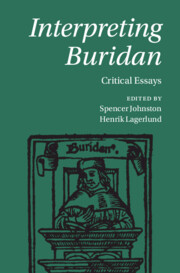Book contents
- Interpreting Buridan
- Interpreting Buridan
- Copyright page
- Dedication
- Contents
- Contributors
- Preface
- Abbreviations
- Introduction
- 1 The Philosopher as Arts Master
- 2 Principles in Buridan’s Logic of Consequences
- 3 Buridan on Paradox
- 4 Modality and Temporality in Buridan’s Logic
- 5 A Paradigm Change within Medieval Philosophy
- 6 Buridan’s Internalism
- 7 John Buridan on the Ontological Status of Artifacts
- 8 John Buridan on Final Causality
- 9 Female Physiology in John Buridan’s Quaestiones de secretis mulierum
- 10 Buridan on the Value of Emotions
- 11 Buridan on Happiness and the Good Life
- References
- Index
3 - Buridan on Paradox
Published online by Cambridge University Press: 01 February 2024
- Interpreting Buridan
- Interpreting Buridan
- Copyright page
- Dedication
- Contents
- Contributors
- Preface
- Abbreviations
- Introduction
- 1 The Philosopher as Arts Master
- 2 Principles in Buridan’s Logic of Consequences
- 3 Buridan on Paradox
- 4 Modality and Temporality in Buridan’s Logic
- 5 A Paradigm Change within Medieval Philosophy
- 6 Buridan’s Internalism
- 7 John Buridan on the Ontological Status of Artifacts
- 8 John Buridan on Final Causality
- 9 Female Physiology in John Buridan’s Quaestiones de secretis mulierum
- 10 Buridan on the Value of Emotions
- 11 Buridan on Happiness and the Good Life
- References
- Index
Summary
Bertrand Russell famously remarked that “a logical theory may be tested by its capacity for dealing with puzzles, and it is wholesome plan, in thinking about logic, to stock the mind with as many puzzles as possible.” John Buridan, like many medieval logicians, adopted the same methodology: he developed and refined his theories of truth and other semantic notions against an array of paradoxes. Indeed, in an appendix to his Summulae de dialectica Buridan gave a succinct but comprehensive introduction to his logical philosophy in the form of responses to a collection of sophisms (his Sophismata). Among these sophisms are the logical paradoxes, the so-called “insoluble,” such as the Liar Paradox (is one who says he is lying, lying or telling the truth?). But before he comes to these especially difficult examples, Buridan tackles puzzles which lead him to reject standard accounts of meaning, truth, logical consequence, tense, hyperintensionality, and other semantic notions. In the final chapter of the Sophismata, he deals with various problems involving self-referential propositions, not all of them insolubles. When he turns at last to the insolubles, he elaborates a revision he had already suggested in his Questions on the Sophistical Refutations to the general solution he had developed for them over a long career in the arts faculty at the University of Paris dealing with philosophical puzzles.
Keywords
- Type
- Chapter
- Information
- Interpreting BuridanCritical Essays, pp. 37 - 50Publisher: Cambridge University PressPrint publication year: 2024



